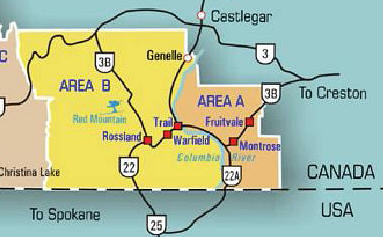Cemeteries full, Trail monorail unlikely: RDKB holds a town hall meeting
Finance-based gatherings can be dull. So kudos to the Area B gentleman who livened things up Tuesday night at the regional district’s Town Hall meeting held in Oasis. Among the enjoyable tidbits revealed regarding the region’s future: a monorail in Trail is unlikely, the district will not be proposing any new bridges, and Pacific Coastal pilots are generally unarmed.
All excellent news. And with that squared away, the meeting turned to more serious matters. The Town Hall meetings are an annual consultative exercise undertaken by the RDKB; administrator John Maclean and operations manager Brian Teasdale tour the region with the relevant elected official to present the district’s preliminary budget numbers for 2011.
The budget numbers are very preliminary at this point, fluctuating slightly day-to-day, but do reveal an expected tax increase for regional services for both Rossland residents and those residing in the rural areas nearby. Area B covers the rural area around Rossland city limits, south to the border, northeast to around Genelle, and ending at the eastern municipal boundaries of Trail and Warfield, where Area A begins.
Despite a $1.3 million drop in the budget for district-wide services (in 2011 over 2010), the portion to be paid from property tax is proposed to increase by approximately $700,000. This funds services the whole district (which stretches as far as Big White) uses, such as waste management, emergency preparedness, 911 access, and general administration. The latter category includes the impact of borrowing for costly, and near-completed, renovations to the RDKB administrative building in the Gulch.
“How’s your office, John?” inquired one mild heckler.
“It’s very nice,” replied an expressionless Maclean, not rising to the bait.
The $3 million plus reno included a new geothermal heating and ventilation system, and window replacement, and will earn the RDKB at least a Silver LEED designation. The project’s taxpayer impact in 2011 will be about $18 per $200,000 of assessed property value, Maclean indicated.
Sub-regional services we pay for include the airport, victims’ services, fire protection and cemeteries, along with the new East End economic development function, managed on contract with the Lower Columbia Community Development Team (LCCDT) and its corporate arm, the Lower Columbia Initiative(LCI).
East End economic development has a regional budget close to $295,000 this year – with approximately $22,000 proposed to come from Area B taxpayers and $44,000 from Rossland.
The regional district lost a battle with the firefighters’ union last year, resulting in a costly three per cent wage increase, though thankfully the recent bout of mandatory (insurance reasons) equipment replacement is coming to an end, with whopping vehicle financing costs scheduled to fall sharply in 2014.
Cemeteries are unexpectedly expensive, with $433,000 budgeted in 2011 and a looming capacity issue: the Fruitvale cemetery is nearly full, and Rossland’s is closed for customers (“You can’t die in Rossland!” shouted one wag), leaving Maclean musing about the potential impact on Trail’s Mountain View cemetery, the only site with capacity.
“We’re going to have to have a nice long conversation with the community,” he said.
Another coming conversation will involve transportation, particularly the future of the regional airport, currently the subject of a study. While Pacific Coastal and the volunteer runway staff post consistently improving numbers on flights landed (versus rival Castlegar) and passengers accommodated, the future of unsecured airports in general might be kindly characterized as “uncertain” in a post-911/exploding underpants-type world.
And expected additional BC Transit service hours in 2012 may also take substantial diplomacy to allocate. The demands are significant, Maclean said, ranging from Rossland parents tired of picking up their teenagers who work late in Trail and keen on a late bus up the hill, to a seemingly popular idea for a route out to the regional airport.
As the early taxation numbers currently stand, Area B residents look likely to pay about $920 per $200,000 of assessed property to support regional services, a 15 per cent increase. Rossland city taxpayers (having opted out of many regional services) are looking at about $500 per $200,000 assessed value, an eight per cent increase to cover regional district services. This does not include provincial school tax or city-specific taxation.
An important caveat: these numbers are incredibly preliminary: they fluctuate with figures not yet finalized by the BC Assessment Authority, and are due to be presented at a public Rossland City Council meeting in March for feedback prior to finalization before fiscal year end.


























Comments